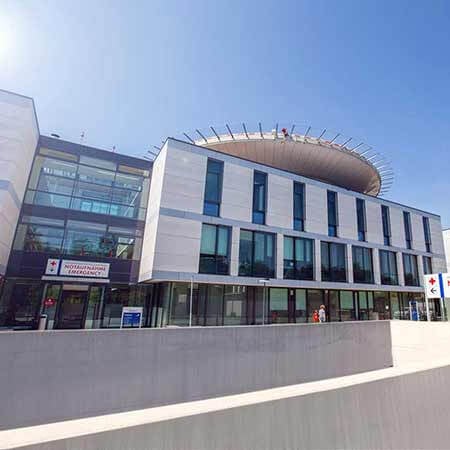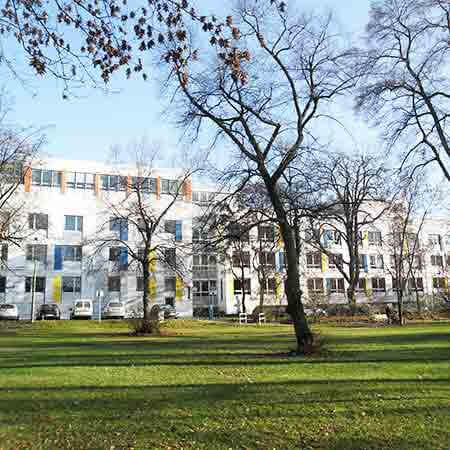Content
- Standard treatment
- Induction
- Consolidation
- Selection of treatment methods
- Treatment in Germany with Booking Health
Myeloblastic acute leukemia is the most common malignant disease of the hematopoietic system. In general, it is rare and its occurrence is about 1% of all cancer cases. The disease rarely develops before the age of 45 years. Most patients are over the age of 60 at the time of diagnosis. Myeloblastic leukemia is rare in children.
Acute myeloid leukemia (AML) is a cancer of the myeloid blood cells.
Depending on the disease stage, treatment of AML includes chemo- and targeted therapy, CAR T-cell therapy, bone marrow transplant.
Price for induction chemotherapy starts at €22,027. Cost of consolidation treatment starts at €44,196. Cost of treatment with CAR T-cell therapy starts at €81,970. You can find other prices on our website.
The best hospitals treatment of leukemia in Germany are:
- University Hospital Rechts der Isar Munich
- University Hospital of Ludwig Maximilian University of Munich
- University Hospital Frankfurt am Main
- Helios Hospital Berlin-Buch
- Clinic of Advanced Biological Medicine Frankfurt am Main
Standard treatment
Depending on the age of the patient and the specificities of the disease, the treatment regimen for acute myelogenous leukemia can vary significantly. A standard therapy includes 2 stages. The basis of treatment is chemotherapy.
- Induction. The goal of the treatment is to achieve a remission – reduction of the number of myeloblasts in the bone marrow to less than 5%, which is normal.
- Consolidation. This is the maintenance of remission as long as possible.
Chemotherapy is started as early as possible because the symptoms of the disease progress rapidly. Hematologists may change the treatment regimen from time to time in order to avoid resistance to the treatment. They often do this prior to the onset of signs of ineffectiveness of chemotherapy.
At the time of detection of the disease, the patients often have signs of leukostasis. This condition occurs due to the accumulation of a large number of myeloblasts in small vessels. They clog them, thereby disrupting the blood supply to vital organs, most often to the brain. To eliminate leukostasis, leukapheresis is performed. This is a procedure, in which blood goes through a device, which removes excess leukocytes.
Induction
An intensive chemotherapy is indicated for patients under 60 years old, but it is poorly tolerated by the elderly. The doses, regimens and the choice of drugs depend on the type of myeloid leukemia, which is determined by the results of red bone marrow examination. Of greatest importance are cytogenetic analyses, which determine chromosomal changes in abnormal cells, and molecular diagnostics, which determine changes in genes (DNA nucleotide sequences).
As a rule, the patient is prescribed two drugs. Sometimes, three medicines can be required at once. This increases the likelihood of achieving remission.
In rare cases, the introduction of drugs using lumbar puncture is required. This is necessary, if acute myeloid leukemia has spread to the central nervous system.
In parallel, maintenance therapy is carried out for the elimination of symptoms and complications. The patient may need the following measures:
- Blood transfusion.
- Antibiotics for bacterial infection suppression (in case of myeloid leukemia, immunity becomes weak).
- Growth factors, which stimulate the maturation of normal blood cells.
- Fluid volume replacement (infusion therapy) in blood loss.
In a week, the doctors perform the second biopsy of the red bone marrow. Most patients have remission after the first course of treatment. If it does not happen, other treatment options suggest:
- Second course of chemotherapy with a change in the regimen.
- Stem cell transplantation (bone marrow transplantation).
Should the positive result be achieved, the treatment will not be completed. The patient requires maintenance therapy or otherwise the relapse may occur within a few months.
Consolidation
The next stage of treatment is maintenance therapy. It is aimed at the destruction of all remaining malignant cells. If the specialists fail to achieve it, at least they can prolong life expectancy of the patient.
Here are some of the consolidation options for patients under 60 years old:
- Several cycles of chemotherapy.
- Allogeneic (from the donor) stem cell transplantation.
- Autologous stem cell transplantation.
Stem cell transplantation offers a better chance of recovery in comparison with chemotherapy. However, this type of therapy increases the risk of complications, including the fatal ones.
The following consolidation options are provided for patients after 60 years old or debilitated patients with concomitant somatic pathologies:
- High doses of one drug.
- Low doses, the use of a combination of 2 drugs.
- Mini stem cell transplantation (transplantation of material without complete destruction of the patient's own bone marrow).
If the doctor concludes that the transplantation is impractical or the patient refuses it, chemotherapy may be complemented with targeted therapy. It also helps to reduce chemotherapy doses and improve treatment tolerance.
Selection of treatment methods
There can be used different therapy regimens. The doses of chemotherapy drugs may be higher or lower. Additionally, targeted therapy may or may not be applied. The stem cell transplantation can sometimes be performed as well. If it is indicated, different treatment options are possible (donor or patient’s own stem cells, mini-transplantation).
The decision on the most effective treatment is made based on the analysis of the following data:
- How quickly the remission was achieved. If the first cycle of chemotherapy decreased the number of blast cells in the bone marrow to less than 5%, this is a good prognostic sign. The patient is recommended for stem cell transplantation in order to try to completely cure the disease.
- Whether the compatible donors are available. The bone marrow transplant from a brother, sister or another person with good compatibility improves the results of the procedure. The allogeneic transplantation is more effective than autologous, but at the same time it is more dangerous. It is used mainly in young patients.
- Whether any unaffected regions of the red bone marrow are presented. The autologous transplantation can also be effective, if it is possible to obtain samples, which are not affected by the malignant process. To destroy the remaining cancer cells, the bone marrow is processed in a laboratory.
- Adverse prognostic factors. Their presence and quantity are taken into account. These can be particular gene and chromosomal abnormalities, the excessively high initial levels of myeloblasts in the blood, the relapse of the disease, its spread to the central nervous system. With a large number of adverse factors, more aggressive treatment may be required, while in a favorable prognosis and prolonged absence of the relapse, the doctor may recommend to delay stem cell transplantation and observe the further course of the disease. Perhaps it can be cured by means of chemotherapy.
- Patient's age and state of health. These may be a limitation for more effective therapeutic approaches when high doses of chemotherapy are applied and stem cell transplantation is performed.
- The patient's requests. The opinion of the patient is always taken into account. The most effective treatment methods are the most risky and uncomfortable at the same time, and moreover, rather expensive. Some patients do not want to undergo aggressive therapy, thereby limiting themselves to maintenance therapy for the elimination of symptoms and the use of low doses of chemotherapy drugs, which can delay the relapse of the disease.
Treatment in Germany with Booking Health
If you want to undergo the diagnosis of acute myeloid leukemia in Germany and the treatment of this disease by leading hematologists in the world, you should use the services of the specialists of the Booking Health company. We offer the following benefits:
- Selection of the best German clinic with a well-equipped Department of Hematology and Oncology, which specializes in the treatment of acute myeloid leukemia and achieves outstanding results in this medical field.
- Your financial expenses will be reduced. The discount reaches up to 50% due to the lack of overpricing and additional coefficients for foreign patients.
- Booking an appointment on the most suitable dates for you.
- Preparation of the program, taking into account previously performed examinations.
- Establishment of communication with the hematologist.
- Monitoring of the program at all its stages.
- Control of invoices and return of unspent funds.
- Buying and forwarding of medicines.
- Organization of additional diagnosis of acute myeloid leukemia in Germany, treatment or rehabilitation.
- Communication with the German clinic upon treatment completion.
The Booking Health company will provide you with top-class services. We will book a hotel for you, meet you at the German airport and take you to the clinic.
Authors: Dr. Vadim Zhiliuk, Dr. Sergey Pashchenko










